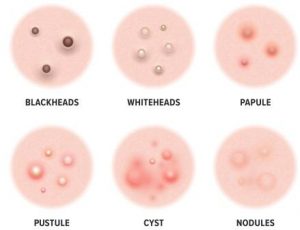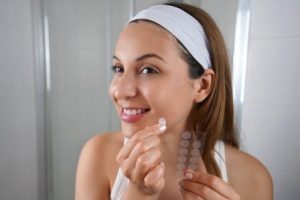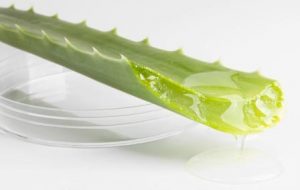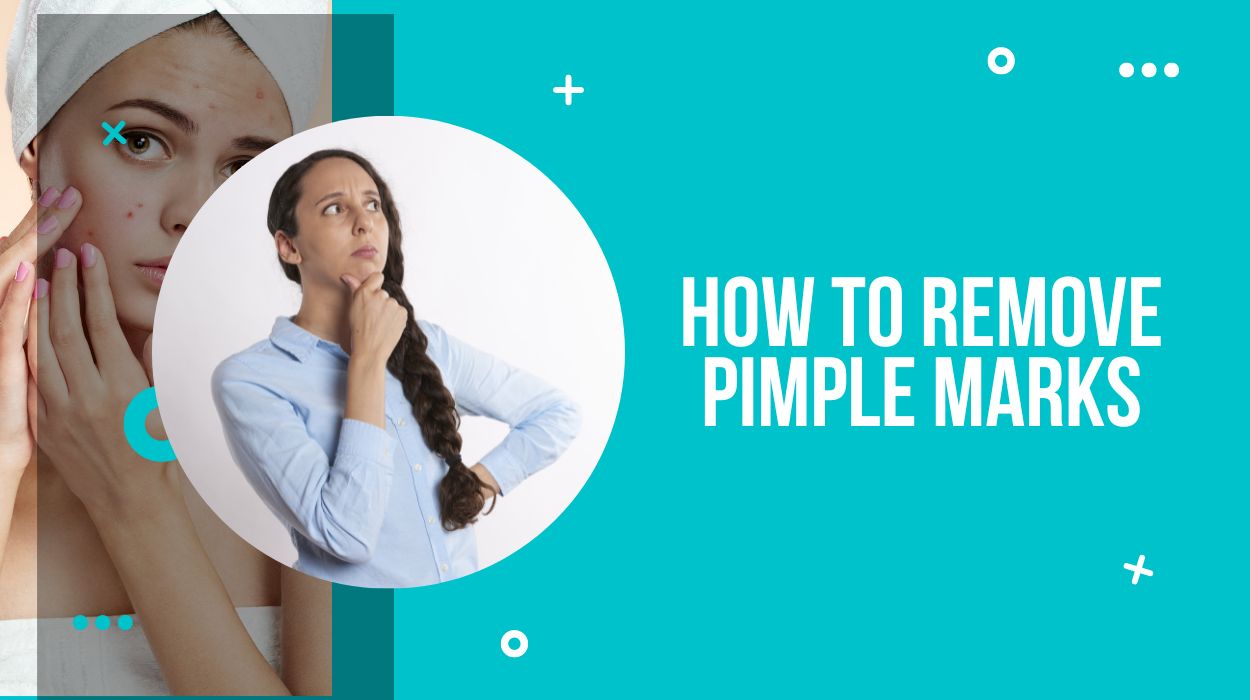You probably want to heal a pimple quickly whenever you get one. Sometimes, however, acne blemishes leave a dark spot on your skin after it has healed. Not uncommon, but frustrating, nonetheless.
It’s crucial to understand what causes dark spots in the first place if you want to get rid of them.
Pimples are technically a type of inflammation that appear on our skin. During the healing process and as new skin cells form, the cells that restore your skin’s smooth surface may have too much melanin.
Your skin’s colour is determined by melanin, and when one cell has more melanin than another, the result is a darker patch of skin. As a result of inflammation, hyperpigmentation occurs.
You’re more likely to develop post-inflammatory hyperpigmentation if you pick at or squeeze a blemish that is not getting better.
Naturally,dark-skinned people are at greater risk of developing this condition. Keep reading to learn how to treat those dark spots leftover from pimples and how to prevent them from occurring in the future.
The Difference Between Dark Spots And Scars

There are different approaches to treating acne scars and acne dark spots. Scars are a result of tissue damage or overgrowth. Scarring is difficult to completely remove, and while it may fade with time, it typically remains noticeable.
In contrast, acne scars are flat against your skin’s surface. The results do not demonstrate any long-term effects on your skin, pores, or follicles.
Over time, dark spots gradually get lighter until they disappear totally. Their disappearance can take anywhere from three months to two years.
Dark spots may not disappear overnight, but that doesn’t mean you have to wait for them too. The good news is, there are many home remedies, over the counter (OTC) products, and dermatological treatments to help you deal with them sooner.
Acne Types
Acne scarring can be a double punishment – first, you had to deal with the pimples, and now you must live with the scars.
Lesions (pimples) on the skin occur when oil and dead skin cells clog the hair follicles (or pores). It is bacteria that grow in plugged follicles that cause the red bumps and pus-filled red bumps called pimples.
Acne takes many forms:
Most of us will get mild acne at some point in our lives, causing whiteheads and blackheads
Acne with moderate severity causes red, inflamed pimples (dermatitis) as well as red pimples with white centres (sinusitis).
Nodules or cysts (called nodules) under the skin are associated with severe acne
Those with severe forms of acne are more likely to develop permanent scarring, while those with nodules leave more permanent scarring.
Acne treatment should be sought as soon as possible after it appears to prevent further severe acne and scarring. Your doctor or dermatologist can provide you with treatment for nodules.
Acne Scar Treatment

Most of the time, those reddish or brownish acne marks left behind after pimples have disappeared will fade without treatment. The risk of scarring can increase if you pick or squeeze acne.
There are two types of acne scars:
- Gradually recessed scars (sometimes called “rolling” scars)
- Those with deep, narrow scarring
Scars can only be treated once the acne has been controlled.
Scarring: Mild vs. severe
The type of treatment for scars depends on their severity. Occasionally, a dermatologist or doctor may suggest a chemical peel or microdermabrasion to help reduce scarring. In most cases, you can perform milder treatments in the office.
A variety of treatments are available for severe acne scarring:
Laser resurfacing –
A dermatologist or doctor can perform this procedure for you. Resurfacing the skin with lasers involves removing the damaged top layer, tightening the middle layer, and smoothing it. The process can take up to an hour. An anaesthetic will first be applied to the skin to reduce pain. In most cases, the skin will heal completely between three and ten days.
Dermabrasion –
The surface of the skin is worn down by using a rotating wire brush or spinning diamond instrument. A new layer is formed over the abraded skin as it heals. When skin is treated with dermabrasion, it may take anywhere from 10 to 3 weeks for it to heal.
Fractional laser therapy–
The healing time for fractional laser therapy is shorter than for laser resurfacing or dermabrasion because it doesn’t damage the top layer of tissue. Those who have undergone such treatment may look a bit sunburnt for a few days.
To raise a rolling scar to the level of normal skin, doctors may inject material under the scar. Lastly, surgery may be recommended to remove deeply embedded scarring.
Using masks and fancy lotions won’t do much to treat acne scarring and may make the scars worse by irritating your skin.
When you get a bad zit, you might develop a red or brownish spot on your face that will eventually disappear. But it sometimes they last till 12 months. Talk to your doctor if you’re worried about acne marks. He or she may be able to suggest how you can deal with them.
Some useful remedies:
Start with home remedies if you want to treat hyperpigmentation that has occurred after inflammation. Sadly, many of these home remedies have no scientific basis other than anecdote. Giving them a try is generally not harmful.
Vitamin C
A lemon juice’s high concentration of vitamin C can brighten skin tone and make it more even. The use of vitamin C as a depigmenting agent has been shown to reduce melanin production in laboratory studies.
Aloe vera

Aloe vera is highly regarded for its ability to heal acne dark spots if you look online. The aloe plant is known for its healing properties, especially when it comes to skincare. Studies have found that regular use of aloe reduces melanin levels in the body, but researchers need to understand how far this effect goes.
Grapeseed extract

Dark spots can be lightened with grapeseed extract, another natural product. For this purpose, no studies have been performed on grapeseed extract. However, studies have demonstrated that grapeseed extract taken orally for six months is beneficial to people with melasma, which is a condition that is like post-inflammatory hyperpigmentation.
Sun protection
Developing a sun-protection routine should be the first step in treating dark spots. No matter how overcast or humid the day is, it’s always a good idea to wear sunscreen with an SPF of at least 30.
There is nothing worse than getting acne breakouts and then having to deal with the scarring they leave behind. We have numerous homemade solutions to choose from, so they do not have to be permanent. However, if you’d prefer to use Home remedies, you still have options.
You Can Treat Acne Scars at Home with These 5 Methods
Apple Cider Vinegar
Apple cider vinegar has anti-inflammatory properties and supports cellular regeneration, which, in turn, reduces the appearance of scars.
You can take the following steps.
To make this mixture, mix 2 tablespoons of water with 1 tablespoon of apple cider vinegar
Cotton ball smeared with the mixture should be used to apply it to the scars
Rinse it with cool water after leaving it on for 5-10 minutes
Repetition once a day is recommended
Lemon Juice and Honey
A honey-lemon mixture is a natural bleach and helps lighten scars while honey has antioxidant properties and speeds up healing.
Add one tablespoon of honey to 10 drops of lemon juice
With your fingers, gently massage this mixture into the affected areas
Rinse off with water after 10-15 minutes after sitting
Rinse off with water after 10-15 minutes after sitting
Daily repetition is recommended.
Potato
There are many health benefits associated with potatoes. Astringent and antibacterial properties make it beneficial for reducing excess oil, blackheads, and scars.
On the affected area, rub a potato slice
After applying the juice to your face, wait for 15 to 20 minutes
Remove it by rinsing it with water
You should repeat this process once per day to see results
Jojoba Oil & Turmeric
The antiseptic properties of turmeric make it a useful treatment for wound healing, while Jojoba oil is beneficial for treating skin damage.
Create a paste of 1 teaspoon turmeric and 1 tablespoon jojoba oil by mixing
Leave it on for 15 minutes
After rinsing with warm water, pat dry
It should be used 2-3 times a week
Aloe Vera Gel
The Aloe Vera plant is one of the most common home remedies used for treating skin. As with acne, it aids the healing process in a similar way. In one study, aloe vera was found to reduce inflammation and scar tissue size when applied directly to wounds. Growing Aloe Vera, yourself or buying it from a store or online are both options.
Select thick leaves at the outer parts of the plant to remove at a time, 3-4 healthy leaves.
You should remove the leaves as close to the stem as possible.
Make sure that the leaves are fresh, clean and patted dry.
With a knife, trim any prickly edges.
Leaves should be separated from their gels by pulling straight down.
Aloe gel can be cut into slices or cubes.
Apply it to your skin after mixing well.
Acne Treatment
Take advantage of your new knowledge by using these ingredients to their fullest! Organic & Natural Anti Acne Products can help treat acne, as well.
A word of warning
You should be cautious about using products that claim to treat acne-related dark spots.
These products include some powerful ingredients such as retinol. Ingredients like these thin out layers of skin. Having smoother and more even skin may appear and feel more appealing, but the risk of UV damage increases.
Your beauty routine should include applying sunscreen every day.
You should also keep in mind that not all cosmetics are regulated by the Food and Drug Administration (FDA). It is particularly important to be cautious when purchasing international or online products.
Despite not listing these ingredients on their labels, cosmetics can contain harmful ingredients like mercury. Do your shopping from trusted vendors only, and exercise discretion.
The importance of seeing a doctor
Dark spots, especially those that appear frequently, or spots that affect your everyday life, need to be addressed by a healthcare provider.
By working with your dermatologist on a treatment plan, you can get an idea of how dark spots caused by pimples will look in the future. You can make a difference by calling on a professional and having a plan.
Conclusion
Sometimes, you produce too many melanin cells to replace damaged skin as your body heals a pimple. We sometimes refer to a dark spot as post-inflammatory hyperpigmentation.
These dark spots can be treated by home remedies, over-the-counter products, and even by dermatologists. When you notice dark spots on your skin from acne, you should see your doctor.


